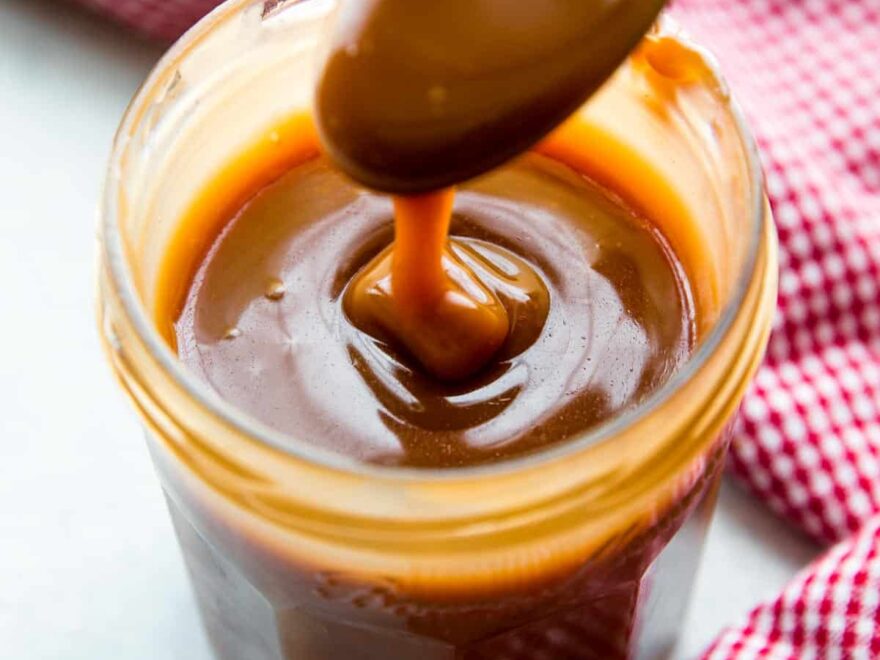Made from only 4 simple ingredients, this homemade caramel is salty, sweet, and irresistibly buttery. No candy thermometer required and the possibilities for serving are endless. (Though just a spoon is acceptable!) Use caution as the cooking caramel may splatter. Stand back and wear kitchen gloves if desired. Review recipe notes prior to beginning.
PREPARATION TIME:
- Prep Time: 5 minutes
- Cook Time: 15 minutes
- Total Time: 20 minutes
Ingredients:
- 1 cup (200g) granulated sugar (make sure it’s labeled “pure cane”)*
- 6 Tablespoons (85g) unsalted butter, at room temperature and sliced into 6 pieces
- 1/2 cup (120ml) heavy cream, at room temperature
- 1 teaspoon salt
Instructions:
-
- Heat granulated sugar in a medium heavy-duty saucepan (avoid using nonstick) over medium heat, stirring constantly with a high heat-resistant silicone spatula or wooden spoon. Sugar will form clumps and eventually melt into a thick brown, amber-colored liquid as you continue to stir. On my stove, this takes about 6 minutes. Be careful not to burn it.
- Once sugar is completely melted, immediately stir in the butter until melted and combined. Be careful in this step because the caramel will bubble rapidly when the butter is added. If you notice the butter separating or if the sugar clumps up, remove from heat and vigorously whisk to combine it again. (If you’re nervous for splatter, wear kitchen gloves. Keep whisking until it comes back together, even if it takes 3–4 minutes. It will eventually—just keep whisking. Return to heat when it’s combined again.)
- After the butter has melted and combined with the caramelized sugar, stir constantly as you very slowly pour in the heavy cream. Since the heavy cream is colder than the hot caramel, the mixture will rapidly bubble when added. After all the heavy cream has been added, stop stirring and allow to boil for 1 minute. It will rise in the pan as it boils. If you’d like to be precise and use a candy thermometer, the temperature will rise to about 220°F (104°C).
- Remove from heat and stir in the salt. The caramel will be a thin liquid at this point. Allow to slightly cool down before using. Caramel thickens as it cools.
- Cover tightly and store for up to 1 month in the refrigerator. Caramel solidifies in the refrigerator. Reheat in the microwave or on the stove to desired consistency.
Notes:
- Make Ahead & Freezing Instructions: You can make this caramel in advance. Make sure it is covered tightly and store it for up to 1 month in the refrigerator. Warm the caramel up for a few seconds before using in a recipe. See “What Is the Texture of This Salted Caramel?” in the post above. This caramel is OK at room temperature for a day if you’re traveling or gifting it. You can freeze the salted caramel, too. Freeze in an airtight container for up to 3 months. Thaw in the refrigerator or at room temperature, then warm up before using.
- Special Tools (affiliate links): Medium Heavy-Duty Saucepan (avoid using nonstick) | Wooden Spoon or Silicone Spatula | Candy Thermometer (optional)
- Sugar: This recipe is most successful using granulated sugar that’s labeled “pure cane” on the packaging. I usually use and recommend Domino brand regular granulated sugar which says “pure cane granulated” on the packaging.
- Heavy Cream: Heavy cream (approximately 36% milk fat) may also be sold as whipping cream. Light whipping cream (30% milk fat), or double cream (48% milk fat) may be substituted. Do not use milk. Room-temperature cream is best.
- Salt: Use regular table salt or kosher salt. If using larger flaky salt, add 1 teaspoon, taste, then add more if desired. This recipe works with 1 teaspoon of any variety of salt. You can always add 3/4 teaspoon, taste, then add more if desired.
- Caramel Candies: This caramel is great as a sauce, topping, or filling, but won’t set up properly to make soft caramel candies. Here is my soft caramels recipe.
- Regular Caramel Sauce: If you want to make regular caramel, reduce salt to 1/2 teaspoon. Do not leave it out completely.
- Larger Batches: Avoid doubling or tripling this recipe. The added volume could prevent the sugar from melting evenly and properly. Make a couple of batches instead.
